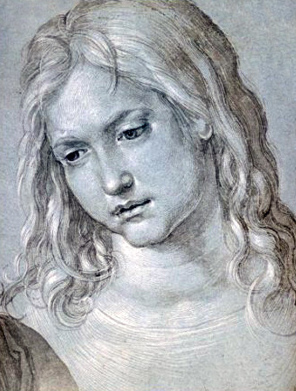Super altare tuum
 The Child King Ioas
The Child King Ioas
It often happens that the Magnificat Antiphon at First Vespers is the key that allows us to enter deeply into Sunday’s Holy Mass. Such is the case today, given that last evening we sang: “Ioas did what was right in the sight of the Lord all the days wherein Ióiada, the priest, instructed him” (4 Kings 12:2). Ioas, the child king of Judah, is, of course, a type of Our Lord Jesus Christ. Like Jesus, preserved from the massacre of the Innocents, Ioas is preserved from a violent death. Jesus, the Child King, comes out from the temple after three days; Ioas, the child king, comes out from the temple after six years.
The rabbinical tradition holds that Ioas was recognised as the legitimate king of Judah by the scars that he bore; Christ; “the Prince of Life immortal” bears the glorious wounds of the stupendous combat of His glorious passion and death. Ioas is a humble man, and gentle, worthy of his grandfather David, and “of all his meekness” (Psalm 131:1); we see in Ioas something of the Son of David who will say, “Take up my yoke upon you, and learn of me, because I am meek, and humble of heart: and you shall find rest to your souls” (Matthew 11:29).
The reign of Ioas is marked by the repairing and beautification of the temple, and by the restoration of right worship. In all of this we see the mystery of the temple that is the Body of Christ, raised up after three days, resplendent with beauty, and drawing all men into itself, there to adore the Father “in spirit and in truth” (John 4:24).
Introit
One hears in the Introit of today’s Mass the poignant prayer of the child king Ioas. One can almost imagine him intoning his grandfather’s words as he emerges from his hidden life in the temple:
When I cried to the Lord He heard my voice, from them that draw near to me; and He humbled them, who is before all ages, and remains forever: cast thy care upon the Lord, and He shall sustain Thee. (Psalm 54: 17, 18, 20, 23).
It is noteworthy that the child Ioas will be sustained by the mediation of the priest Ióiada, who will faithfully instruct him in the mysteries of the covenant and in holiness of life. There is something touchingly benedictine in Ioas’ willingness to be taught. So long as he remains humble “in the school of the Lord’s service” (Rule of Saint Benedict, Prologue) under the tutelage of Ióiada, he will do what is right before the Lord.
Gradual
The Epistle reminds us that it is only under the overshadowing of the Holy Ghost and by His divine inspiration, faithfully transmitted in the liturgical tradition of the Church, that one can worship rightly, confessing Jesus as Lord. The Gradual gives the prayer of the little Ioas, hidden away in a secret chamber of the temple. It is also the prayer of every soul called to enter into the grace of hiddenness.
Keep me, as the apple of thy eye. Protect me under the shadow of thy wings. Let my judgment come forth from thy countenance: let thy eyes behold the things that are equitable. (Psalm 16: 8, 2)
Alleluia
The alleluiatic verse, soaring into the heights of the 7th mode, sang ecstatically of the restoration of the temple and of right divine worship under King Ioas:
A hymn, O God, becometh thee in Sion: and a vow shall be paid to thee in Jerusalem. (Psalm 64:2)
Gospel
With the Holy Gospel, we find ourselves drawn again into the temple. The temple is absolutely central to today’s Mass. Here it is the setting of a prayer that utterly conquers the Heart of God: “O God, be merciful to me a sinner” (Luke 18:13).
Offertory
As so often happens, the Offertory antiphon prolongs the Gospel. Today, it gives us an amplification of the prayer of the publican in the temple,”O God, be merciful to me a sinner” (Luke 18:13). Is it not the same humble publican who, full of confidence, goes on to pray, “To thee, O Lord, have I lifted up my soul. In thee, O my God, I put my trust; let me not be ashamed” (Psalm 24: 1–3)? And Our Lord tells that, having made this prayer, “this man went down to his house justified . . . because he that humbleth himself shall be exalted” (Luke 18:14).
Communion
The Communion antiphon, sung while the faithful approach the true and indestructible Temple, that is the adorable Body of Christ, recalls King Ioas’ old work of restoration, even as it calls us to the new work, the Opus Dei, to which nothing else must be preferred:
Thou wilt accept the sacrifice of justice, oblations and whole burnt offerings, upon Thy altar, O Lord. (Psalm 50:21).
In the Communion antiphon there is a note of utter confidence: “Thou wilt accept” — Acceptabis. All that is brought to Christ, the Child King, the Priest, the Victim, and the Altar, is acceptable to the Father. The little and the humble, the poor and the brokenhearted, are not turned away. All that is given to the Child King finds place upon the altar of His Heart — super altare tuum — and there is assumed into the worship in spirit and in truth that the Father so desires.
